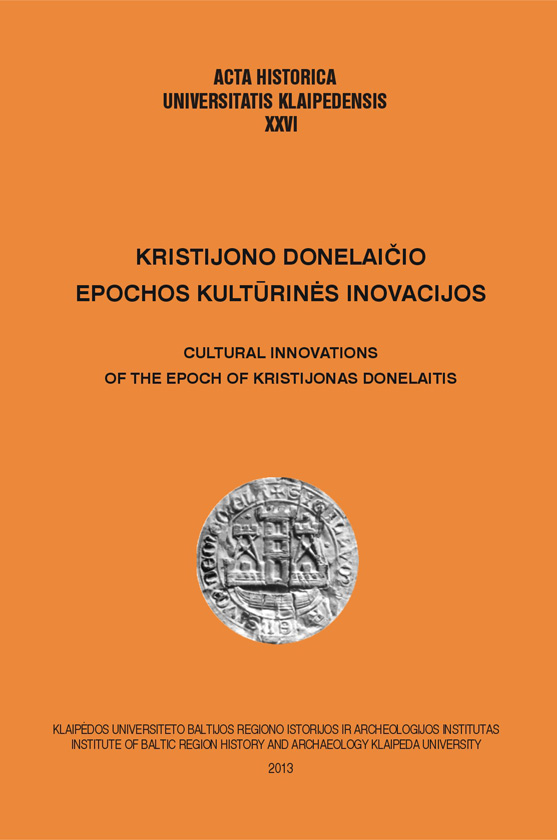Volume 26 (2013): Kristijono Donelaičio epochos kultūrinės inovacijos = Cultural Innovations of the Epoch of Kristijonas Donelaitis, November 2013

Order by:
Pub. online: 19 Nov 2013
Type: Article
 Open Access
Open Access
Journal:
Acta Historica Universitatis Klaipedensis
Volume 26 (2013): Kristijono Donelaičio epochos kultūrinės inovacijos = Cultural Innovations of the Epoch of Kristijonas Donelaitis, pp. 99–111
Abstract
Pub. online: 19 Nov 2013
Type: Article
 Open Access
Open Access
Journal:
Acta Historica Universitatis Klaipedensis
Volume 26 (2013): Kristijono Donelaičio epochos kultūrinės inovacijos = Cultural Innovations of the Epoch of Kristijonas Donelaitis, pp. 112–125
Abstract
Pub. online: 19 Nov 2013
Type: Article
 Open Access
Open Access
Journal:
Acta Historica Universitatis Klaipedensis
Volume 26 (2013): Kristijono Donelaičio epochos kultūrinės inovacijos = Cultural Innovations of the Epoch of Kristijonas Donelaitis, pp. 126–134
Abstract
Pub. online: 19 Nov 2013
Type: Article
 Open Access
Open Access
Journal:
Acta Historica Universitatis Klaipedensis
Volume 26 (2013): Kristijono Donelaičio epochos kultūrinės inovacijos = Cultural Innovations of the Epoch of Kristijonas Donelaitis, pp. 135–147
Abstract
Pub. online: 19 Nov 2013
Type: Article
 Open Access
Open Access
Journal:
Acta Historica Universitatis Klaipedensis
Volume 26 (2013): Kristijono Donelaičio epochos kultūrinės inovacijos = Cultural Innovations of the Epoch of Kristijonas Donelaitis, pp. 148–165
Abstract
Pub. online: 19 Nov 2013
Type: Article
 Open Access
Open Access
Journal:
Acta Historica Universitatis Klaipedensis
Volume 26 (2013): Kristijono Donelaičio epochos kultūrinės inovacijos = Cultural Innovations of the Epoch of Kristijonas Donelaitis, pp. 166–174
Abstract
Pub. online: 19 Nov 2013
Type: Source Publication
 Open Access
Open Access
Journal:
Acta Historica Universitatis Klaipedensis
Volume 26 (2013): Kristijono Donelaičio epochos kultūrinės inovacijos = Cultural Innovations of the Epoch of Kristijonas Donelaitis, pp. 175–187
Pub. online: 19 Nov 2013
Type: Book Review
 Open Access
Open Access
Journal:
Acta Historica Universitatis Klaipedensis
Volume 26 (2013): Kristijono Donelaičio epochos kultūrinės inovacijos = Cultural Innovations of the Epoch of Kristijonas Donelaitis, pp. 188–193
Pub. online: 19 Nov 2013
Type: Discussion
 Open Access
Open Access
Journal:
Acta Historica Universitatis Klaipedensis
Volume 26 (2013): Kristijono Donelaičio epochos kultūrinės inovacijos = Cultural Innovations of the Epoch of Kristijonas Donelaitis, pp. 194–198